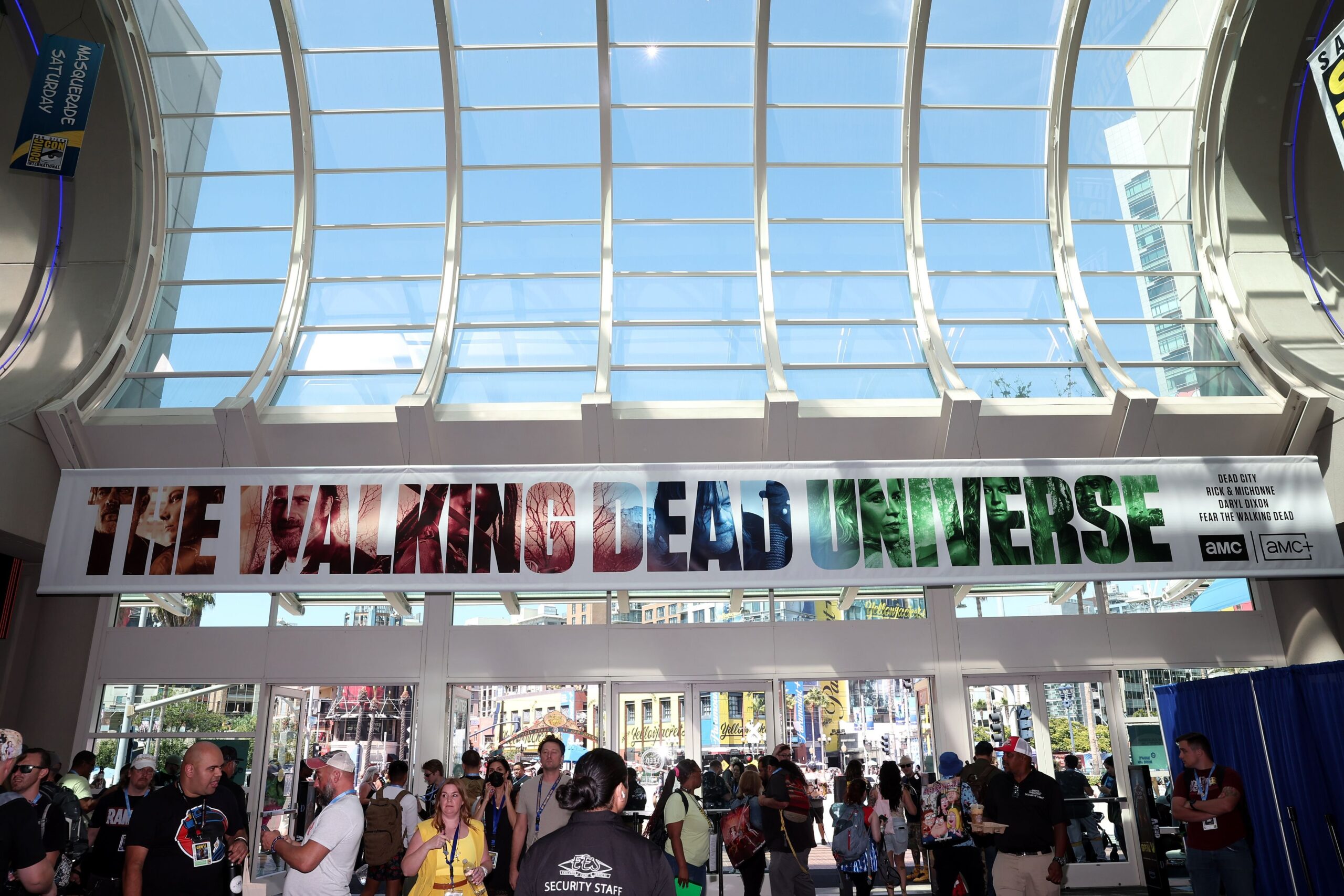
The Walking Dead Comic Con Panel By John Salangsang (Shutterstock)
In “Dead or Alive Or” the Alexandrians have entered a desperate no-man’s-land somewhere between total conviction and faithlessness; how are they to navigate this, indeed, murky terrain? Greg Nicotero‘s fantastic swamp and its undead residents are a rich symbol for the ground they are forced to cover in this episode. They are in a state of fatigue, shock, and uncertainty that requires some faith in order to keep moving forward — how much faith though?
He’s Still Breathing
With as close as Tara and Daryl have become, you would think Tara would take a cue from Daryl’s compromised though diplomatic approach to Dwight. Daryl, someone who is famously emotional and reactive, is capable of working with a man that tortured him as long as it helps them win, but Tara can’t get over the fact that he (accidentally) killed her girlfriend, Denise, seasons ago.
Compared to Daryl, Tara comes off as a little petty and selfish here. By constantly goading Dwight and allowing herself to remain on a murderous edge with him, she is endangering the entire group. When you are running from your enemies with children and refugees through a walker ridden swamp, it is neither the time nor the place, Tara.
How has Daryl managed to become more level-headed, with a conviction to save his people, which no personal qualms could rattle, while the once chill Tara is consumed with a brash vendetta of revenge and hate? Considering the past, how can Daryl choose to have faith in Dwight while Tara chooses to have none?
Though Tara has seen her share of bloodshed, we must remember that she has missed out on some of the more traumatizing, Savior-induced events in this conflict. Daryl, on the other hand, has a more extensive and intimate history with the Saviors, and this creates between them a diametrically opposed view on Dwight. Daryl caught a glance of who Dwight really is (or was) when he first met him in season six, before Negan the man was even in the picture. Dwight even passed their “test” when Daryl threw the three questions at him.
Dwight was a man who loved and who did not want to kill. Daryl then saw him transformed, both physically and morally, into a subjugated foot soldier, a deformed soul sentenced by circumstance to carry out a life of tragedy and meaninglessness. He is like two people in one; he is somehow both good and bad. And I do believe that Dwight is a good person, and I think Daryl believes it too. Daryl saw what Negan did to Dwight, and even under Dwight’s ordered torture of him, because of this, Daryl can understand and empathize with Dwight. Tara, adversely, has seen Dwight only as a monster.
She had never heard of him until she came back from a run which occurred during Negan’s bloody introduction. So, she heard about Dwight and about Denise, Glen, and Abraham’s deaths all at the same time. These differing perspectives explain Tara’s annoyingly insistent lack of patience with Dwight. How will their faith in Dwight, or lack of it, affect their survival?
Right away, Tara becomes another character to ignore Carl’s dying warning about turning people away, and I don’t think that will play out well for her, Dwight, or anyone. With Daryl taking a swing at Rick not long ago, she seems lucky to get off with a stern verbal warning from him after pushing Dwight away and back to the Saviors.
Daryl understands that Dwight is the ever shifting fulcrum in this heavily weighted, constantly changing conflict; Dwight must always be positioned in their favor because he could destroy them if he doubles back with the Saviors. Daryl has struck a balance between maintaining a total devotion to the idea that nothing will stop them from getting their people to safety and yet remaining adaptive enough to make necessary compromises.
Now that Daryl has come back around from his bout of anger and shaky judgement, perhaps Tara should just have faith in him on the Dwight issue.
Who’s Driving?
Father Gabriel has more explicit conflicts concerning faith in this episode. He has an inner conflict with himself and his religious convictions, and he has a conflicted relationship with Dr. Carson. These two characters are utterly different, almost stereotypical in their roles. Even the symbolism employed in their scenes is quite on the nose. Gabriel represents faith and Dr. Carson represents science. One represents belief and one represents reason. How are these two able to come together, and why does their plan shatter?
They are constantly opposed, yet oddly in the most supportive of ways, and they seem to move forward on their mission like tandem wheels, one running entirely on faith and the other entirely on reason. One can’t seem to get anywhere without the other because having a perspective skewed too far in either direction creates imbalance and blind spots. In fact, they spend the whole episode looking for a set of wheels, so to speak, and we literally see them in a car trying to navigate together while mentioning having god “take the wheel.”
This suggestion by Carson would come off as some kind of comedic relief if Gabriel had not followed it up with his bizarre and characteristically creepy comment about letting god into the car. He is almost totally blinded at this point due to his fever. He can only hear a lone walker outside the car and imagines that it must be god in Carson’s scenario. He makes a comment about letting him in the car so as not to leave a trail of his footprints along the road.
When Gabriel finally gets a good enough look at what’s really outside, I think the audience is just as disturbed as he is. That’s not God; that’s a walker. God is not there. He is not leaving any footprints. As he drags himself along the road, not even the walker has feet with which to leave evidence of itself. Has god abandoned them altogether?
Despite all, Gabriel remains determined in his faith while Carson remains staunch in his pragmatism, and they hail their awkward progress toward finding a ride (and fulfilling Gabriel’s spiritual purpose) as accomplishments of teamwork and the winning over of Carson toward Gabriel’s brand of blind conviction.
Right when faith seems to have won out — in the situation and within Carson and Gabriel themselves — they could not have been proven wrong with more cruelty and quickness. As soon as Carson took liberty with his new found faith inspired by Gabriel, he got himself shot (a callback to Beth’s overstepping of the line with Dawn).
Right before his nearly blinded eyes, Carson as well as Gabriel’s entire purpose dies, unceremoniously and without burial. What does this say about the role of spirituality and faith in TWD world?
How can characters like Tara and Gabriel learn to temper their convictions with reason and coolness? How can characters who seem to have lost their very engines, like Gabriel, Maggie, and Rick, find a new reason — a new conviction — to move them forward?
This and the last episode have been a deepening descent into hopelessness. The repeated symbol of that which is maimed floods this episode. Maybe some things just can’t heal or grow back. Maybe once some things break, they are simply broken — like our fragile faith in ourselves, in each other, and in whatever else which may or may not be leaving its invisible footprints behind us.
Hopefully for our beloved characters, faith can’t always be lost.
Other Lingering Questions
- Where will Dwight stand with Negan once he returns to the Sanctuary? Will his missing vest, if Negan sees that Daryl has it back, be what gives him up?
- How will Maggie lead the defense at the Hilltop?
- Has Negan reverted back to psycho-mode just as he was beginning to seem human?
P.S. The season eight finale is screening in theaters!
Ciara Cerrato was a projectionist and curator at the Hot Springs Documentary Film Festival, and she currently is a poet and freelance writer in New York.














